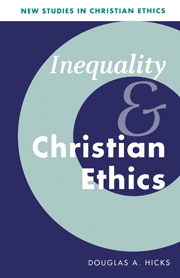Book contents
- Frontmatter
- Contents
- List of figures and tables
- Acknowledgment
- General editor' preface
- Preface
- List of abbreviations
- PART ONE CONTEXTUALIZING INEQUALITY
- PART TWO CONSTRUCTING A CHRISTIAN ETHICAL APPROACH
- PART THREE TRANSFORMING DISCOURSE, PERSONS, AND SOCIETIES
- Appendix A The Gini coefficient, inequality, and value-claims
- Appendix B Constructing Gini coefficients in income, education, and health/longevity
- Appendix C The construction of the HDI and the IAHDI
- Bibliography
- Index
General editor' preface
Published online by Cambridge University Press: 05 June 2012
- Frontmatter
- Contents
- List of figures and tables
- Acknowledgment
- General editor' preface
- Preface
- List of abbreviations
- PART ONE CONTEXTUALIZING INEQUALITY
- PART TWO CONSTRUCTING A CHRISTIAN ETHICAL APPROACH
- PART THREE TRANSFORMING DISCOURSE, PERSONS, AND SOCIETIES
- Appendix A The Gini coefficient, inequality, and value-claims
- Appendix B Constructing Gini coefficients in income, education, and health/longevity
- Appendix C The construction of the HDI and the IAHDI
- Bibliography
- Index
Summary
This is the sixteenth book in the series New Studies in Christian Ethics. The subject of inequality has concerned quite a number of theologians over the last few years. However, few if any of them show the sort of sophistication offered by Douglas Hicks in this book. In some respects Inequality and Christian Ethics is similar to the first book in the series, Kieran Cronin's Rights and Christian Ethics. The latter noticed that theologians often talk about “rights” but seldom show that they have a rigorous understanding of the detailed discussion of this issue in recent philosophy. Douglas Hicks has also noted a similar gap in the theological literature, although in this case in relation to the philosophical and economic discussion of equality and inequality.
There are further points of contact between Douglas Hicks's Inequality and Christian Ethics and other books in the series. Peter Sedgwick's The Market Economy and Christian Ethics is probably the closest. Both books offer a detailed account of socio-economics in the modern world, which is well informed and also careful not to claim too much in the name of Christian ethics. David Fergusson's Community, Liberalism and Christian Ethics offers a similar tension on the crucial issue of Christian distinctiveness in a pluralistic society, which differs significantly from the “ecclesial ethics” approach of theologians such as Stanley Hauerwas.
- Type
- Chapter
- Information
- Inequality and Christian Ethics , pp. xv - xviPublisher: Cambridge University PressPrint publication year: 2000



